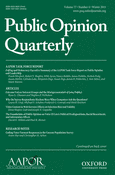-
Views
-
Cite
Cite
Thomas A. Birkland, Lonna Rae Atkeson and Cherie D. Maestas. Catastrophic Politics: How Extraordinary Events Redefine Perceptions of Government. New York: Cambridge University Press. 2012. 273 pp. $99.00 (cloth)., Public Opinion Quarterly, Volume 77, Issue 4, Winter 2013, Pages 1032–1034, https://doi.org/10.1093/poq/nft037
Close - Share Icon Share
Extract
Political science research on disasters as social phenomena is not as common as in disciplines such as sociology and geography, but in the past 20 years, political scientists have begun to engage in more sophisticated studies of the political aspects of disaster.
In Catastrophic Politics, Lonna Rae Atkeson and Cherie D. Maestas avoid the case-study, one-off nature of many studies of disaster phenomena—often confined to a vain search for “electoral effects”—by considering the effect of “extraordinary events” on perceptions of politics and governance more broadly. Their theory of attention to extraordinary events can be applied comparatively to many events over a long time. They test this theory on attitude formation after Hurricane Katrina, which, as they show, is clearly the most important disaster in recent years in terms of its influence on news coverage and opinion formation: only the September 11 attacks got more attention from the nightly television news than did Katrina. They do so using carefully collected data on television news coverage and on public opinion in the immediate aftermath of the storm. In testing the theory, they provide us with a theory of the politics of “extraordinary events” more broadly.





